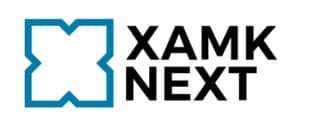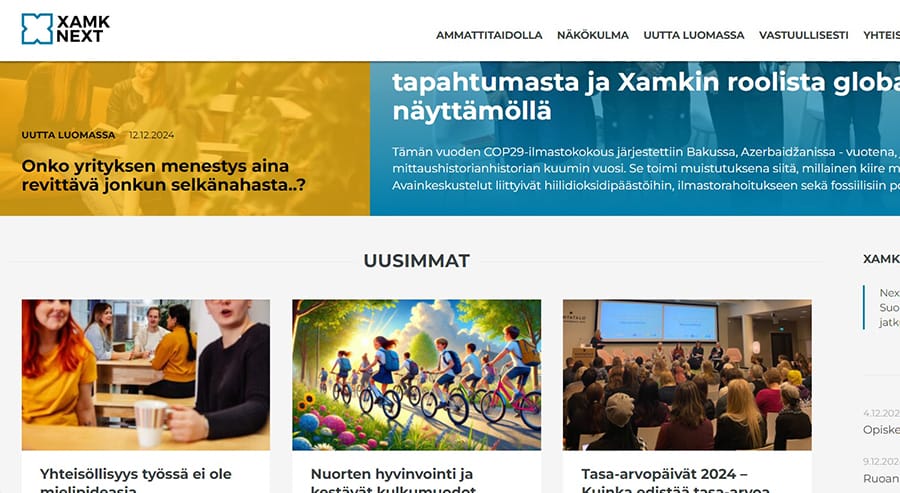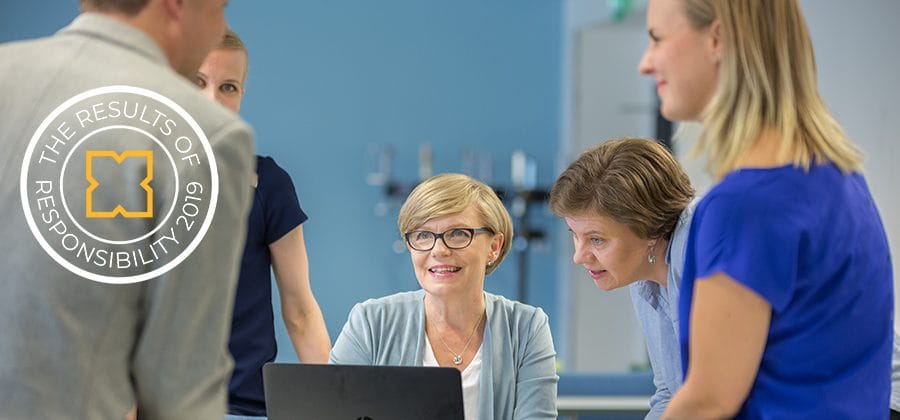Responsible regional impact
 Together with other universities of applied sciences and supported by the Rectors’ Conference of Finnish Universities of Applied Sciences (Arene), Xamk has initiated the process of specifying and developing sustainable and responsible operations, with the objective of promoting climate sustainability in higher education. In the background lie the UN principles of sustainable development and the need to adapt to climate change as Finland is aiming to become the world’s most innovative country in climate solutions (Vidgren & Lyyra 2020).
Together with other universities of applied sciences and supported by the Rectors’ Conference of Finnish Universities of Applied Sciences (Arene), Xamk has initiated the process of specifying and developing sustainable and responsible operations, with the objective of promoting climate sustainability in higher education. In the background lie the UN principles of sustainable development and the need to adapt to climate change as Finland is aiming to become the world’s most innovative country in climate solutions (Vidgren & Lyyra 2020).
In addition, according to the target specified in the agreement between the Ministry of Education and Culture and Xamk, education, social responsibility and impact, sustainable development, ethical standards and good scientific practice will be emphasised in the activities of higher education institutions in 2025 (the performance agreement for 2017–2020 between the Ministry of Education and Culture and South-Eastern Finland University of Applied Sciences, 2016).
The UN Agenda 2030 for sustainable development
The UN Agenda 2030 for sustainable development aims for the elimination of extreme poverty and promotes sustainable development. The agenda includes 17 Sustainable Development Goals (SDGs) and their respective 169 targets. According to the sustainable development goals of the UN Association of Finland (2015), people’s wellbeing and human rights, financial welfare and social stability are ensured in a manner that is sustainable for the environment. The goals are mutually dependent and can be achieved only through extensive and responsible co-operation.
The responsibility and sustainability of universities of applied sciences contribute to their regional impact. Responsibility and sustainability must be visible – from input to output and from effect to effectiveness. This refers to immediate and quickly achieved quantitative results but also the effectiveness of the results from the perspective of sustainable development (see also Potinkara 2018).
Responsibility reporting at Xamk
Responsibility reporting at Xamk is based on Xamk’s strategy and the social responsibility and sustainability programme; the action plan and financial plan; and performance monitoring and feedback. Altogether, there are 110 indicators monitored – or even more if all meters and statistics are included. Responsibility is incorporated into everything we do. It is our way of working.
In this article, I discuss some developments of regional impact from the responsibility perspective. Xamk’s social responsibility and sustainability report in its entirety describes how Xamk currently defines responsibility and regional impact. Impact is demonstrated quantitatively with the specified indicators and qualitatively with the shared perception of performance.
Xamk’s task as a responsible institution with regional and social impacts
Xamk carries out its tasks relating to regional and social responsibility through the education it provides as well as its research, development and innovation (RDI) activities. Xamk’s strategy for 2020 emphasises future-oriented education, international activities to promote vitality and efficient RDI activities.
The future-oriented education provided by Xamk enables the development of new professions of the future and ensures dynamic development of competence. It also coaches and inspires students to learn, research and become entrepreneurs and trailblazers. International activities bring know-how and international professionals into the region and promote co-operation and business opportunities.
The RDI activities are a key component of our regional and social impact. They help Xamk to develop solutions to meet the needs of companies and the business community (Xamk’s strategy brochure 2020).
Regional influence through education
 Xamk provides degree programmes, continuous-learning education and continuing education. They serve the educational needs of the residents and companies in the region.
Xamk provides degree programmes, continuous-learning education and continuing education. They serve the educational needs of the residents and companies in the region.
The effects of education include increased know-how and career opportunities. The increased know-how in turn promotes the development of business life. By providing opportunities for continuous learning and continuing education, we can ensure the maintenance and updating of know-how.
Read more: Open University of Applied Sciences makes studies accessible to everyone (Pia-Mariana Toukkari)
Each year, approximately 1,500 students graduate from the degree programmes provided by Xamk. According to the follow-up carried out in 2017, nearly 50 per cent of them find employment in the South Savo and Kymenlaakso regions. In addition, many Xamk graduates are employed in the Uusimaa region.
RDI activities and regional impact
Research, development and innovation (RDI) activities constitute one of Xamk’s basic tasks. In Xamk’s operating region, growth, development and specialisation are pursued through international activity and digitalisation.
In 2019, the value of the active RDI project portfolio was over EUR 60 million. The volume was similar to that of 2018. At Xamk, 271 employees worked full-time in research and development, an increase of approximately 20 from the previous year.
In 2019, Xamk had 259 ongoing RDI projects, of which 54 were international projects. RDI activities nearly always have a regional impact, influencing the development of the region, the companies in the region and other stakeholders.
Read more: Regional development in South-East Finland and internationally (Hanna Kuninkaanniemi)
Read more: International co-operation in student exchange and education (Marja-Liisa Kakkonen)
Responsible regional impact – outlook
Analysing responsible regional impact is still challenging, as there are no indicators for it. Results that are based on complex and interprofessional collaboration are also difficult to verify, as the effects of the different factors and participants cannot always be distinguished from each other.
The strategic character of Xamk’s educational, international and RDI activities involve diverse co-operation with regional, national and international partners. The work is carried out for the benefit of students, companies and other organisations, as can be concluded from Xamk’s social responsibility and sustainability report 2019.
Xamk has also started to develop data analytics, which will enable time series analyses and the monitoring of qualitative development trends in the future. The data analytics and the specification of sustainable development indicators by Arene will provide a solid foundation for describing and analysing responsible regional impact as well as reporting it to our students and stakeholders.




